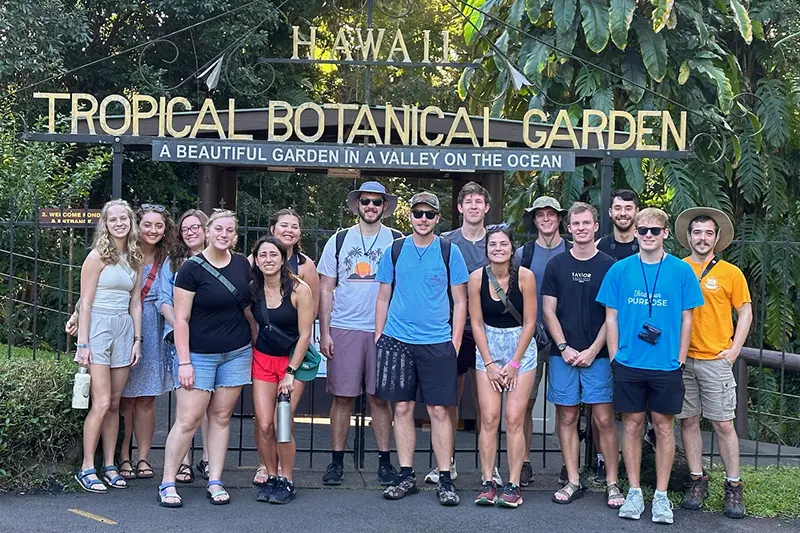How do students attending a university in the middle of Indiana get experience with tropical biology? Thanks to Taylor’s unique January term, 15 students traveled to Hawaii for an intensive three-week Tropical Biology class. Biology majors, Environmental Science majors, and students taking the course for foundational core credits attended the trip.
This trip has been offered for three years so far, and Taylor students get real-life exposure to tropical biology and Hawaiian culture. From hiking a volcano to participating in a cultural festival, these students from a midwestern campus have the opportunity to travel for an experience they can’t receive anywhere else in the world.
Professor of Biology and Allied Health Advisor Dr. Jan Reber and her husband, Assistant Professor of Environmental Science Robert Reber, led the trip.
Immersive Biology Course
The class started on the Big Island of Hawaii and spent a few days on the Kona (west) side. There, they learned about the culture, snorkeled in the ocean, and started getting familiar with the groups of plants and animals there. They spent the next ten days of their trip on the Hilo (east) side. The students visited what is often referred to as the “wettest spot on earth,” where they learned about the biology and geology of the island system.
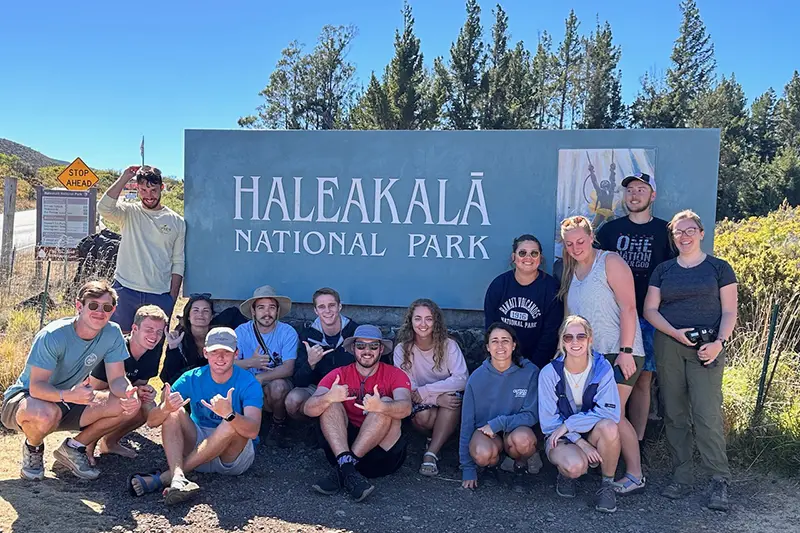
They hiked to the top of Kilauea Volcano and across Kilauea Iki crater, saw how the volcanoes add to and take away from the land, saw endangered honeycreepers, and went to the Hawaii Tropical Botanical Garden. They saw over 1,000 different varieties of plants growing wild.
They also visited some of the places that were destroyed in 2018 by a volcanic eruption when 700 homes were buried by lava. After leaving the Big Island for Maui, they also discussed the devastating effects of the August 2023 wildfire in the town of Lahaina.
After learning about these natural disasters and their impact on the local people, the Taylor team volunteered their time with Habitat for Humanity to help build two houses in a community on a hill above Kihei on Hawaiian homestead land.
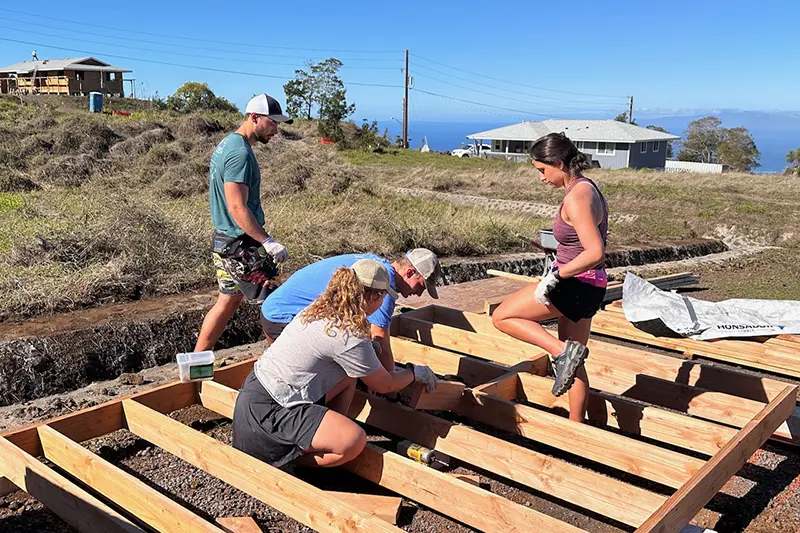
In Maui, the students did more snorkeling, learning that the reefs are more developed due to Maui being much older than the Big Island.
The Rebers found that the Hawaii trip has been a way for them to teach a culturally relevant class. With the cross-cultural component, the class has an extra valuable emphasis.
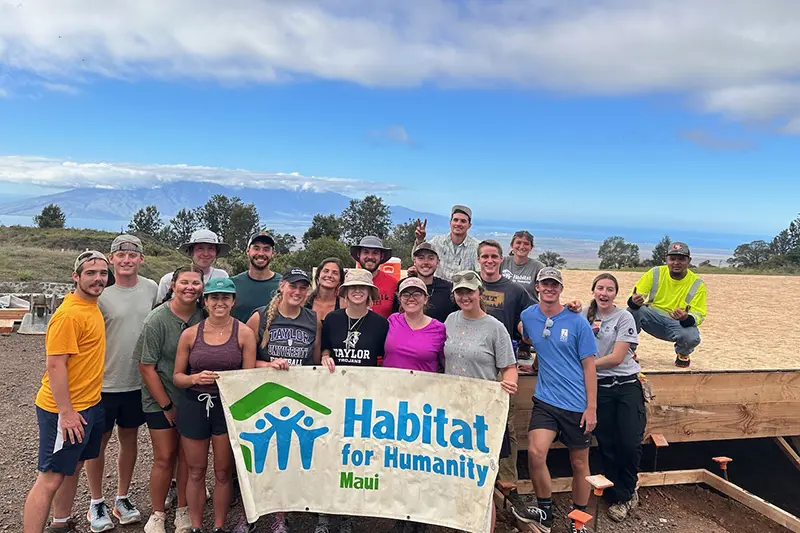
Hale Pule Ke Ola Hou Church and Men of Pa’a
In Hilo, a church has continually welcomed the groups from Taylor University—Hale Pule Ke Ola Hou. An organization called Men of PA’A has emerged from this church. This Christian organization is run by Iopa Maunakea, a native Hawaiian who comes from a long line of people who are interested in making life better for the local people.
The main thrust of Men of PA’A is ministry to men who are coming out of incarceration. It’s an opportunity to make amends: even if they can't change their past, they can change how the future looks.
“The pastor and several of the elders are former felons,” Dr. Reber said. “And so they all have this very big heart for ministry. They have men's Bible studies in the prison and they also run a camp for children of incarcerated parents at the end of every summer.”
Maunakea took the Taylor students under his wing and taught them about the Hawaiian perspective of land and caring for it. He taught the students how to build an imu (traditional underground oven), cook kalua pork, and put together a true family gathering party. This year, Dr. Reber was set on letting the Taylor students not only be served by the church but also serve in return.
This year, Maunakea designed the Makahiki Festival (named after the Hawaiian season of farming, peace, and family). The festival was open for anyone to attend. The students helped Maunakea do imu cooking on his farm and prepare the vegetables. They spent the entire day setting up for the big party.
When the festival began, the Taylor students got to enjoy it as guests.
“They learned hula, which always tells a story,” Dr. Reber said. “Every movement has a meaning. They learned how to make leis from tea leaves. They learned how poi, which is like the Hawaiian version of the potato, is a staple at every meal. And they also had a chance to sit down and talk with Hawaiian elders and ask them any questions that they wanted.”
The Makahiki Festival was featured on a local Hawaiian news channel. They interviewed Robert Reber and mentioned Taylor University in their broadcast.
“As the rhythmic sway of hula graced the Men of PA'A Makahiki Cultural Festival, it wove a tapestry of cultural significance, blending seamlessly with other segments,” Maunakea shared about the festival on his Facebook page. “Hula, the heartbeat of our heritage, harmonized with lei making, poi pounding, and the intergenerational connection from Keiki to Kupuna. In the embrace of tradition, each segment resonated, creating a vibrant celebration that echoed the spirit of Imu Mea Ai – where the essence of our culture is not just preserved but shared, from one generation to the next.”
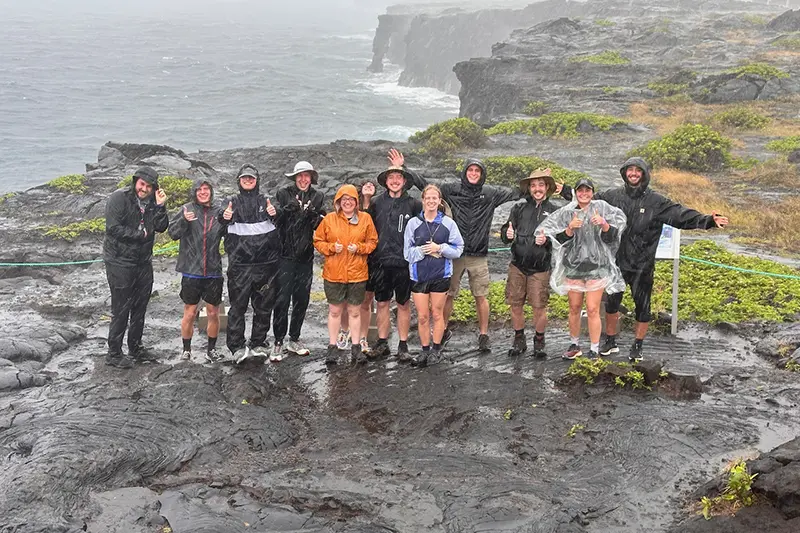
More Biology Trips
Tropical Biology is not the only opportunity Taylor offers for biology students to do outdoor studies. In July, the Rebers teach a month-long course in South Dakota and Wyoming for Biology majors. Students stay in the Black Hills of South Dakota for three weeks, visiting Custer State Park (home to 1400 bison), Mt. Rushmore National Memorial, Badlands National Park, and Devils Tower National Monument. In the fourth week, they visit Grand Teton National Park, the Bighorn Mountains, and Yellowstone National Park in Wyoming.
The trip covers geology, animal biology, and plant biology.
“Educational philosophy says that it’s better to show than to tell,” Dr. Reber said. “And this is as close as you can get to showing without telling. They're breathing it in, they're smelling it, they're seeing it, they're hearing it, they're tasting it, depending on what it is and where we're at. That’s why Taylor has so many travel courses—because you can teach anything in a classroom, but you can't necessarily teach all of it equally well in a classroom.”
Travel for Biology Field Studies at Taylor
Taylor’s Biology program and Evironmental Science & Sustainable Development program exposes its students to advanced biology internships, research in cell and molecular biology, biology courses focused on current scientific trends, and a breadth of real-world experiences guaranteed to prepare them for a career in biology or further education in graduate school.
Taylor offers students a Christ-centered, faithful study of living things that’s driven by academic excellence. Schedule a visit today to see it in action.

